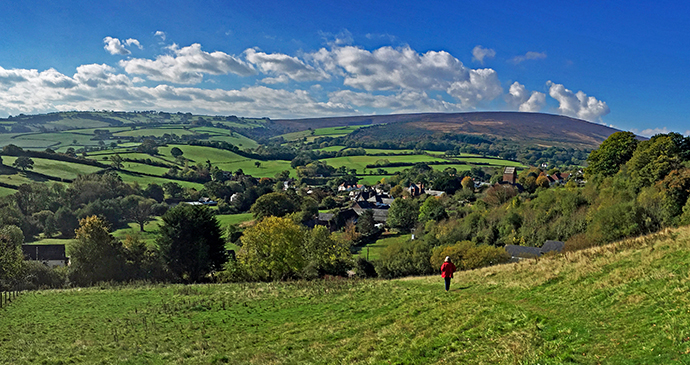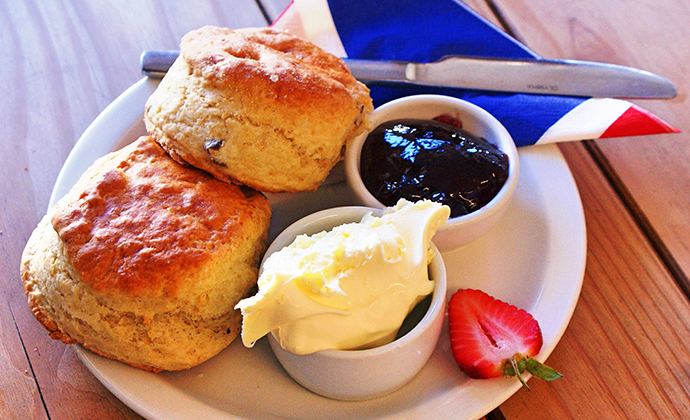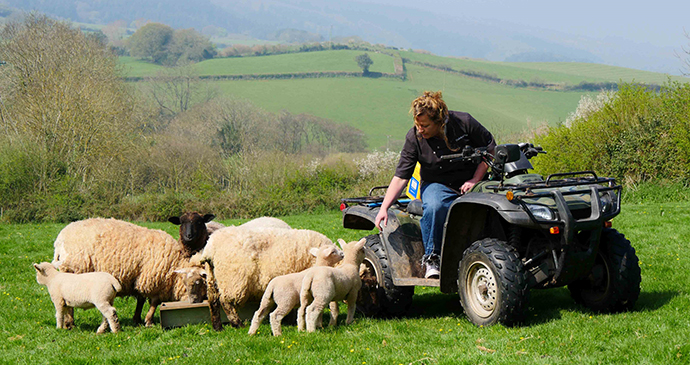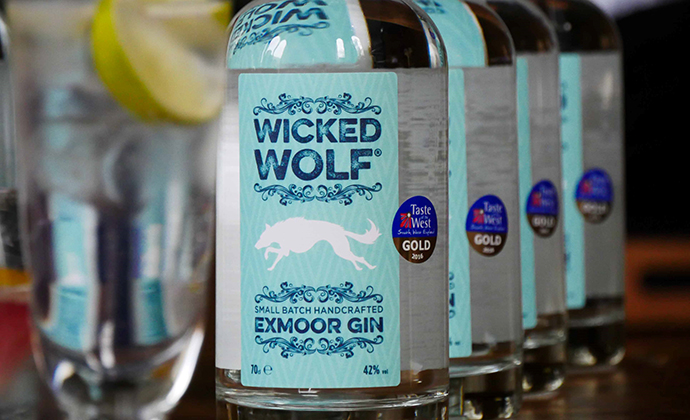By eating food farmed in the region, you are literally eating Exmoor.
Exmoor produces some of the best food you can find anywhere. The harsh, hilly environment lends itself to extensive livestock production. Cattle and sheep are allowed to graze over large areas and mature slowly, as nature intended. And on the more fertile soils a surprising variety of food and drink are produced.

By eating food farmed in the region you are literally eating Exmoor – hence Eat Exmoor, an award-winning 2018 initiative to bring together ‘field to fork’ people, from farmers to shops that sell local produce and restaurants that source their food and drink locally. These include blueberry growers, oyster farmers and even a marshmallow maker. Arable farming is a challenge on Exmoor, so organic farms such as Hindon are relatively rare because of the typically infertile soils and short growing season.
A comprehensive website for Exmoor’s food producers is edibleexmoor.co.uk. The region also has its food festivals, the main one being Exmoor Food Festival held each February, when you can find special food deals throughout the area. Lynton and Lynmouth also have their Lyn Food Festival every September, with lots of local stands.
Dairy treats
The taste of Exmoor is undoubtedly that of clotted cream. A cream tea is as integral a part of a visit to this region as rain (indeed, the one often leads to the other).

Clotted cream is quite unlike any other sort of cream, being as thick as butter and almost as yellow; it contains more fat (around 63%, while double cream is 48%), and traditionally was made by gradually heating fresh milk using steam or hot water, and allowing it to cool very slowly. The thick cream that rises to the top was then skimmed off.
The original term was clouted cream, clout being the word for patch, referring to the thick crust that forms when the cream is heated.
Clotted cream is only made in Devon and Cornwall, and we Devonians are not only convinced that ours is better but that we got there first. After all, it was one of the wives of the Dartmoor giant, Blunderbus, who won her husband’s affection by bringing the knowledge of clotted-cream-making to his kitchen. The story is slightly spoiled by the fact that Jennie was exiled to a cave in Cornwall at the time for being a lousy cook, and it was a Phoenician sea captain who taught her the process as a reward for saving his ship from wreckers.
Clotted cream is served with fresh scones, which should be warm from the oven not the microwave; purists prefer plain scones but others, myself included, love the fruit ones. In Devon we spread the cream on the scone first, instead of butter, and add jam on top; in Cornwall it’s the opposite: jam first, then clotted cream. Either way it’s utterly delicious – and very filling. The Victorian prime minister William Gladstone was right when he called clotted cream ‘the food of the gods’.
Talking of jam, an Exmoor speciality is whortleberry jam. Whortleberry is the Exmoor name for bilberry, a heather relative which grows on the moor.
As you would expect by the seaside, there is a proliferation of ice cream parlours and locally made ice cream. One producer in particular stands out: Liscombe Ice Cream, where you can watch cows being milked by robot while enjoying your cone.
Meat
Meat eaters are in for a treat here. Some hotels convert to shooting lodges in the winter so pheasant, partridge, woodcock and venison feature on many country menus.

The native cattle could claim to produce the best steak in England. The nickname for the north Devon breed of cattle, Red Ruby, is appropriate: these animals are a beautiful chestnut red, the colour of a ripe conker. They are prized for their docility, hardiness and ability to convert grass to succulent, marbled meat. Most of the herds you will see grazing in the Exmoor fields are grown slowly, outdoors (though the climate is such that they need to be brought inside during the winter), with the calves staying with their mothers until they are weaned.
Another native breed, Exmoor horn sheep, has adapted to the conditions here over the centuries. And Exmoor has adapted to the sheep, so the landscape you enjoy today owes as much to the grazing of these animals as it does to nature. The sheep are all-white and, as the name suggests, both rams and ewes have horns. They are dual-purpose animals, raised for wool as well as meat – in the days when mutton was regularly eaten they were considered to have the finest meat of any breed. Devon closewool sheep are another breed from Exmoor favoured for meat and hardiness.
Booze
If clotted cream is Devon, then cider is Somerset although western Somerset is not in the heart of cider country. For this you need to go east to flatter areas where the cider-apple orchards grow, though small cider producers flourish in our region.
Secret Orchard Cider produces award-winning ciders including Exmoor Clear and Exmoor Mellow, as well as the slightly stronger Exmoor Rabbit.
Exmoor also has some small breweries, including Fat Belly in Lynton and Madrigal in Lynmouth, and you’ll find these ales in most farm shops and stores selling local products.
The largest brewery is Exmoor Ales in Wiveliscombe. Their best-known cask ales are Exmoor Gold and Exmoor Beast but they do a total of ten, some permanent and some seasonal.
Also in Wiveliscombe is Cotleigh, whose beers are named after predatory birds: Tawny Owl, Golden Seahawk and Buzzard. They also do seasonal brews such as Rednose Reinbeer.

If it’s the stronger stuff you’re after, Wicked Wolf Gin is making a name for itself. It’s run by a husband-and-wife team in Brendon who are proud of the 11 premium botanicals that go into it.